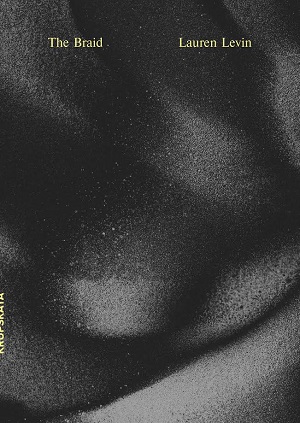 The Braid, by Lauren Levin
The Braid, by Lauren Levin
Review by Raul Ruiz
You don’t know me, so what’s my opinion worth to you? What could I possibly do to qualify my belief that this new book, The Braid by Lauren Levin, is a spectacular, awe-inspiring project that will become an important book in the genre of the long poem? I am now going to stand on my head for an hour just to prove it to you. Faith, after all, is half the work of living.
It has been some time since I’ve encountered a book of poetry with such scope. Levin’s ability to form room enough for her poems to expand and meander while sustaining an incredibly singular tenor makes me want to touch the green sky. And though the book is enormous in content and in its aim to complicate structure (in other words, to claim it completely), I want to focus on the two aspects that I think are Levin’s greatest art: her attention to the liminal, and the necessities of motherhood writ large.
First, can I show you a tiny handful of this book’s light? From the first poem, “The Braid,”
Between myself and where everyone is
Under Mirabeau Bridge the river slips away between where my body stops and the world begins
It doesn’t have to be chronological, though she was bornIf that’s the space, the braid weaves around a space impossible to fill
In that emptiness I watch time drift in her, accumulate, while elsewhere it doesn’t build up, it drifts and is sold
The first aspect I want to focus on is The Braid‘s function as a book about accumulation and refraction as a means to generate liminal regions. Levin is a master at creating spaces where opposite energies meet to form crowded empty forms, a perfect formal technique to denote the contemporary solitude among the frequencies of endless information abutting our lives. Here, Apollinaire’s poem “Mirabeau Bridge” (which begins, “Under Mirabeau Bridge the river slips away…”) crowds the space and time that a birth establishes to create an emptiness where time grows, where “a space impossible to fill” is born. This attention to liminality as foundational to loneliness sprouts blossoms of meaning throughout, so much so that I have often kissed the pages of this book, often in public, with eyes all starry.
The second aspect deals with what parenting actually necessitates. I am not a father, but I am not completely ill-equipped to discuss this, I don’t think, having been a first-row witness to the work of my own parents (is this going to get mushy? you must be asking yourself). Here, can I just go ahead and show you another bit from the book? This one from the poem titled, “I Want Our Minds to Be the Same,”
I keep reading Pasolini’s poem “Rage”
It’s about exiting a rose-shaped sphere of safety
and becoming public property
And because safety is intolerable but so is being property
because whether you are known or unknown is intolerable
the poem speaks truly to say that this condition is the author of rageI dreamed that I asked my mom if she was annoyed with me
She said yes and that bugged me
Holy oxytocin! I want to focus our attention on Levin’s use of the word “property.” It is no accident, I think, that she uses the word in relation to Pasolini’s work. For what Levin is talking about when she talks about property isn’t a chip in the large schema of commerce and ownership (though these concepts are indeed enormous tectonic plates that push against the form), but more the age-old concept of each of us belonging to each. In exploring the work of motherhood, Levin inhabits a mode of writing that asks the reader to think about their own relationship to selflessness and selfishness, to how we make ourselves the “property” of others, of how we serve all others stuck in the puke of this our current world. Because just as the daughter in the poems, Alejandra, at some point says, “I want to grow a tree and chop it down,” so are all of us the agents of tremendous violence. And yet, we are loved nonetheless. There are endless fields that require tending to. The enormity of these poems makes room enough for us all to find our form of courage.
The Braid is available now through Krupskaya.
Raul Ruiz earned an MFA from San Francisco State University and has worked with writers at San Quentin State Prison. He is currently at work on his first book of poems.
